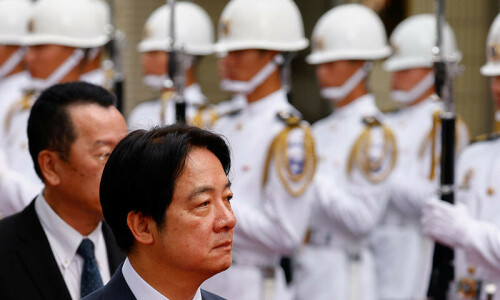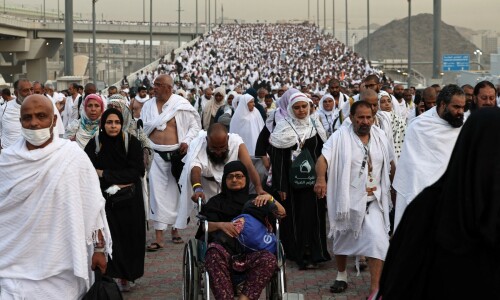JUST as the fog was lifting over the mountains of the Iranian province of East Azerbaijan to reveal the remnants of the weekend catastrophe, another bit of startling news burst onto the scene. Over at the International Criminal Court (ICC), chief prosecutor Karim Khan, who has been investigating the war crimes taking place in the Israel-Palestine conflict, issued a statement announcing that he had requested arrest warrants for Israeli Prime Minister Benjamin Netanyahu and Israeli Defence Minister Yoav Gallant. In the same statement, Khan announced that he had also requested arrest warrants for Hamas leaders Yahya Sinwar, Ismail Haniyeh and Muhammad Diab Ibrahim al-Masri.
Unsurprisingly, Khan’s statement was met with criticism from all sides. Hamas leaders accused him of equating the victims of the war with the perpetrators. Israel’s deputy attorney general in turn denounced the action, calling it completely “divorced from facts” and accused it of making a “mockery of the heinous charge of genocide”. The request for warrants is now with the judges of the ICC, who will evaluate whether the evidence submitted by Karim Khan is adequate for the warrants to be issued. If they decide that there is adequate evidence submitted in support of the arrest warrants, these will then be issued. Once issued, the warrants can be enforced in any one of the 124 countries that are signatories to the treaty that created the ICC, which is “the world’s only permanent international court with a mandate to investigate and prosecute genocide, crimes against humanity, and war crimes”.
Israel is not a signatory and does not accept the jurisdiction of the ICC. However, if the warrants are issued then Netanyahu or Gallant could be arrested in any one of the 124 countries that are signatories. In his statement, Khan stated: “Notwithstanding any military goals they may have, the means Israel chose to achieve them in Gaza — namely, intentionally causing death, starvation, great suffering, and serious injury to body or health of the civilian population — are criminal.”
Khan’s statement also holds Israel responsible for deliberately causing the hunger crisis in Gaza. The “total siege over Gaza”, with the cutting off of humanitarian aid, water, medicines and the items needed for human survival, is the basis of violation of international humanitarian law and of the charge of war crimes. Linked to these is the “collective punishment against the civilian population of Gaza”, where the indiscriminate bombing of hospitals filled with patients and compounds crowded with displaced persons were targeted with impunity.
In terms of which side has more to lose, it is certainly the Israelis.
In turn, Hamas leaders have been indicted based on evidence collected at the sites of the Oct 7 attacks, areas which Khan had visited, along with documentary proof and survivor interviews. The Hamas attacks led to about 1,200 civilian casualties — a figure far outnumbered by the tens of thousands that the Israeli forces have killed and continue to kill with each passing hour. Despite this, Khan has stated, it is crucial that the ICC be seen as applying the law to both sides. If the arrests are actually made and the leaders from either side tried for their crimes, those that have killed several thousands would automatically be subjected to far greater penalties.
The question, of course, is whether such arrests or trials would ever take place. In terms of which side has more to lose, it is certainly the Israelis. Hamas is already classified as a terrorist organisation by many countries. Its leaders facing arrest warrants may abridge their travels to some extent, but their movement is already greatly limited by the classification of the organisation. They do not represent the government of a recognised state.
The situation is different on the Israeli side where Netanyahu and Gallant are treated as dignitaries wherever they go. Unlike Hamas leaders, they have never faced any kind of curtailment on their movements as they attend conferences and convenings and make state visits. The issuance of arrest warrants would mean the sudden cessation of this kind of freedom of movement and the label of an ‘indicted war criminal’, awaiting arrest and trial, would chase them from place to place. Countries that are signatories to the treaty would have to either provide embarrassing assurances to the war criminals that they will not face the consequences that the criminal court has deemed for them or allow them to be arrested. Such dealings will undoubtedly be mortifying for a state that has become arrogant and cruel as it rains unending devastation on the civilians of Gaza.
Every step of the ICC’s investigation and prosecution of this war is, in fact, a danger to the state of Israel, which was created after World War II as part of a moral imperative to provide a country to the persecuted Jews, who had borne much torment under the Nazis. Israel has now occupied the tormentor’s seat as it decimates the Palestinians. However, judging by interviews and news reports, Israel now seems rather befuddled at its new shameful status as the world’s emerging pariah.
Karim Khan’s warrants especially if they are granted by the judges of the ICC, as one expects they will be, are bound to turn Benjamin Netanyahu and Yoav Gallant into pariahs on the international stage, which will likely spell the end of their already fragile political positions at home. At that point, they may be even more vulnerable to arrest and trial. The week is not yet over but the end of many leaders has either come or is being predicted. The world is transforming in a sudden fashion — it is changing not over years and decades but within hours, days, weeks and months. Living in this period of history, we are learning that events can be frightening and hopeful at the same time.
The writer is an attorney teaching constitutional law and political philosophy.
Published in Dawn, May 22nd, 2024














































Dear visitor, the comments section is undergoing an overhaul and will return soon.